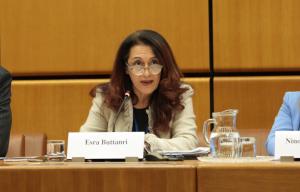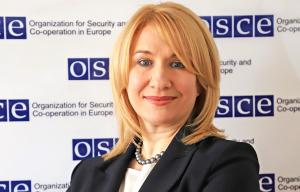Saule Mukhametrakhimova
Media and Outreach Officer, Communications & Media Relations - OSCE Secretariat
Before joining the OSCE in 2015, I worked as a programme manager/editor for an international NGO that supports journalists and civil society activists in countries in conflict. I was involved in training journalists in conflict reporting and in providing media training to human rights activists in the Caucasus, Central Asia and Russia. My journalism background comes from working with the BBC World Service where I was a radio journalist. Earlier in my career, I worked as a media assistant in the German Embassy in Kazakhstan. Working for the OSCE gives me insight into the decision-making processes at the international level and how inter-state diplomacy works. This was exactly the experience I was looking for after many years in journalism and in the civil society sector.
When I attended a meeting of the Permanent Council, an OSCE decision-making body, for the first time I had the feeling that all the things that I had learned about international relations and world politics during my Master’s studies were coming alive before my eyes. During these meetings you can see how participating States interact with each other, how they represent the positions of their countries and how they negotiate when a decision needs to be made. Not an easy process given that in the OSCE there are 57 countries involved. But equally, when all the participating States agree on something, it becomes a powerful impetus to drive change in areas where the OSCE works: be it preventing and combating violence against women, enabling young people to contribute to peace and security or improving the safety of journalists.
What I like the most about my job is that I get to work with diverse groups of people: members of the public, journalists, colleagues from other parts of the Organization – the Secretariat, Field Operations and Institutions – as well as with members of the participating States’ delegations. There is always something exciting happening here. As a media and outreach officer, you might be contacted by a journalist and asked to organize an interview with OSCE officials. Sometimes it is me who is contacting the media to publish an article by the Secretary General or other OSCE representatives. It is our job to make sure that the public knows how the OSCE’s work is making difference to their lives and I communicate with colleagues from other parts of the OSCE to write stories about such projects.
It is very satisfying to see the results of the work you have done, for example when an OSCE op-ed calling to prevent a humanitarian crisis in a conflict zone is published in a well-known newspaper that reaches tens of thousands of readers or when users share your Twitter posts about the costs to society of violence against women. If you are interested in global politics and inter-state relations, working in an international organization like the OSCE is the right place to be. The OSCE has a lot of things to offer, including a diverse working environment. If you are someone who enjoys being with people from different cultures and backgrounds, you will definitely enjoy working here!


